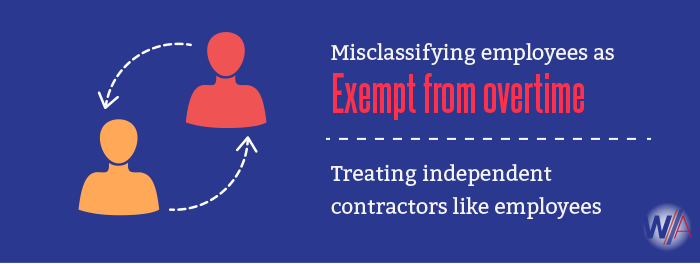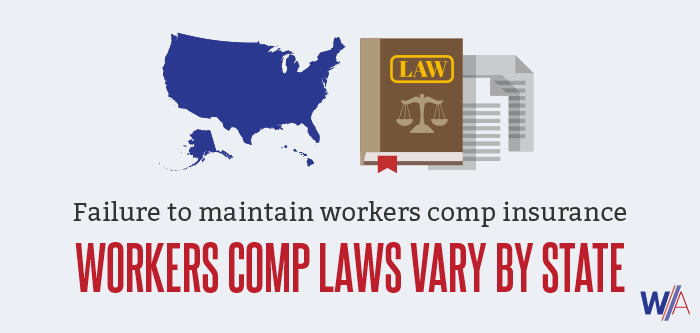Workers’ Rights Violations: 7 Ways Your Employer May Be Breaking Labor Laws
Rightly or wrongly, most employees believe that their employers have a handle on labor laws. In practice, however, thousands of companies are guilty of violating labor and wage laws every day. Ultimately, it’s on you, the worker, to make sure your rights are not being infringed upon.
Some businesses do it intentionally, withholding earned wages to save a buck or discriminating against employees based on real prejudice. Other companies make mistakes, accidentally infringing on their workers’ rights and violating federal laws. In the realm of labor law, intentions don’t really matter; breaking the law is breaking the law, plain and simple.
Some labor law violations are so common, and so poorly-enforced, that they’ve gone from being infractions to accepted practice. In many cases, workers don’t even know that their rights are being violated. Here are five prevalent workers’ rights violations to look out for in your own workplace.
1. Failure To Pay Minimum Wage
The federal minimum wage in America is $7.25 per hour. Many states mandate higher rates, and workers are entitled to the more generous wage.

Minimum wage violations are particularly prevalent among tipped employees.
Labor standards establish that workers who make more than $30 per month in tips are entitled to a cash wage no less than $2.13 per hour. However, if your rights are being violated, it is on you to make sure that your compensation meets or exceeds the legal minimum. This is to say, it is unlikely that your employer will notify you if your compensation during a particular month of employment did not meet the federal minimum wage.
Lastly, while employers are allowed to factor tips into their minimum wage obligations, they can’t deduct more than $5.12 from a tipped employee’s hourly wage.
2. Employee Misclassification
Employee misclassification is another common violation of employment laws across states, according to the United States Department of Labor.
In recent years, businesses have turned more and more to independent contractors – but continue treating them like real employees. The incentive for this illegal behavior is strong: companies don’t have to pay payroll taxes, overtime pay, or offer benefits to independent contractors.
But if your employer controls when, where, and how you work, labor laws will likely consider you an employee and not a contractor. That means you should be entitled to the minimum wage and overtime pay. If you are not receiving these benefits, then it’s possible your worker rights are being breached.

Across the country, employers have begun paying out real penalties over wage and hour violations.
In recent years, company executives and business owners have been hit with significant fines, even jail time, for intentionally failing to pay overtime wages – a clear sign that the Labor Department is willing to get personal in the face of these workers’ rights infringements.
For instance, in 2015, the agency recovered more than $74 million in back wages for over 102,000 misclassified employees throughout industries like food service, daycare, and hospitality.
3. Failure To Pay For Work Breaks
Most workers are entitled to wages for every hour of work, even jobs performed outside of normal hours and outside the workplace. It should go without saying: when you work, you need to get paid for that time.
This requirement extends to scheduled breaks, including the ones you have to work through. Have to work through a break or meal period? That’s compensable work time, although many companies attempt to withhold wages automatically for breaks. Believe it or not, shorter break periods are usually compensable, too.

In general, breaks of 20 minutes or less should be considered work, not time off. You should be paid for that time.
4. Taking Illegal Deductions Out Of Wages
Lots of wage deductions are legal, although some might be surprising.
Generally, employers in most states are allowed to remove money from your paycheck to cover damaged property in the workplace, cash register shortages, required employment uniforms, and tools. These deductions, however, can never bring your wage below the minimum wage. That would be a breach of laws of employment and therefore illegal.

In some cases, employer laws also dictate that any wage deduction must be discussed with you beforehand. Moreover, if you qualified for overtime pay in a work week, employers are required to get your permission before taking any portion of those wages to reimburse a cash shortage or property damage.
5. Keeping Inaccurate Records
Accurate records are essential to maintaining a legally-compliant business. They also make conducting investigations over possible wage and hour violations easier.
The Fair Labor Standards Act, America’s main wage and hour laws, say that the vast majority of employers have to keep accurate records of hours worked and wages paid, including overtime pay, for all covered employees in their workplace.

In most cases, employers are required to notify workers before changes in pay rates. And while reducing a worker’s pay is entirely legal, businesses almost always have to give you one week’s advance notice during which you should be paid at your previous work wage.
Note that reducing a worker’s pay for discriminatory reasons is prohibited, in direct violation of workplace discrimination laws, and could open employers up to a lawsuit.
6. Failure To Maintain Workers Comp Insurance
In most states, employers of any size are required to maintain adequate workers compensation policies. These are insurance plans that kick in when employees get hurt in the workplace. Such laws are intended to guarantee the safety and health of employees, regardless of the line of work. These mandates are in addition to any occupational safety standards dictated by federal laws.
There’s only one state that doesn’t require workers compensation insurance for the vast majority of its businesses: Alabama. No business, no matter how large, is required to provide its employees with workers comp in Alabama.

Obviously, Alabama is an outlier. Most states say that every company within their jurisdiction, even businesses with only one part-time employee, need to have workers comp insurance. There are, however, exceptions to this general mandate, usually based on how many workers a company routinely employs:
- In Alaska, every business with three or more employees must have workers comp.
- In Florida, companies with four or more employees are required to carry workers comp.
- In Georgia, businesses with three or more employees must have workers comp insurance.
- In Kansas, businesses with an annual payroll gross of $20,000 or less do not need to carry workers comp.
- In Mississippi, companies with five or more employees need to have workers comp.
- In Missouri, business with five or more employees must have workers comp insurance.
- In New Mexico, companies with three or more employees need workers comp.
- In North Carolina, employers with three or more employees must carry workers comp.
- In South Carolina, businesses with four or more employees need to carry workers comp insurance.
- In Tennessee, companies with more than five employees must have workers comp – except in the construction industry. Everyone in construction must have workers comp.
- In Texas, workers compensation isn’t mandatory, except for governmental construction contracts. The state does, however, allow injured employees to make claims for compensation if their employer refuses to pay monetary benefits.
- In Utah, agricultural businesses with a payroll of $50,000 or less don’t need to have workers comp. Every other business does.
- In Virginia, companies with three or more employees need to have workers comp.
- In West Virginia, agricultural businesses with fewer than five workers and casual employers with fewer than three workers are exempt from the state’s workers comp requirements. Everyone else must carry workers comp insurance.
- In Wisconsin, companies with three or more employees need to have workers comp.
7. Restricting Employee Speech
Employees can’t organize, and advocate for their best interests, without information. That means open communication, especially about wages and pay inequities, are essential in the workplace.
The National Labor Relations Board says that most employers are not allowed to prevent their employees from discussing pay and salaries, inside or outside of the workplace. This is a civil right, not just workers’ rights, and is one intended to eliminate workplace discrimination, particularly in relation to compensation.
Even considering this, numerous companies have work policies on the books that prevent employees from openly talking about their wages. In the vast majority of cases, these kinds of internal employment policies are illegal.

Interestingly enough, you also possess the right to complain about your job, including on social media.
Many companies try to limit what individuals under their employment can say on social media, but the National Labor Relations Board has repeatedly ruled that these attempts to curb employee speech violate workers’ rights. Employee discussions, especially negative ones, are essential for workers who want to band together and change unfair or unsafe working conditions.
Employers are not allowed to retaliate against employees who engage in such discussions. That being said, employers are usually allowed to prohibit employees from making false and malicious statements, along with harassing, bullying, or discriminating against other employees or company officers.

